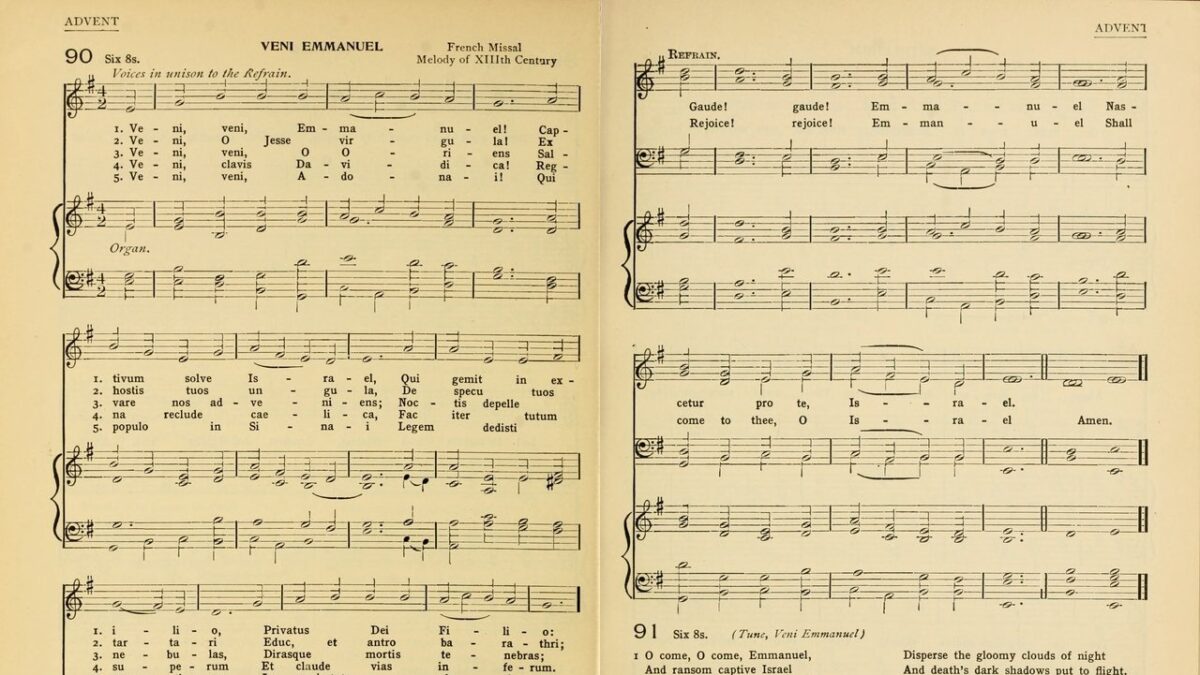
Harry Potter author J.K. Rowling and country music artist Sturgill Simpson have something in common: They’ve both created art that is controversial among traditionalists while focusing on love as their core message.
Simpson is an up-and-coming singer who has been called the savior of traditional country music. His style hearkens to Hank Williams and Merle Haggard—a welcome relief to those weary of syrupy pop-style country music. But the themes of his songs are hardly traditional. The opening verse of his highly acclaimed song “Turtles All the Way Down” criticizes the perceived harshness of Western religion and explores spiritual themes that are more Eastern: “I’ve seen Jesus play with flames in a lake of fire that I was standing in/Met the devil in Seattle and spent 9 months inside the lions den/Met Buddha yet another time and he showed me a glowing light within/But I swear that God is there every time I glare in the eyes of my best friend.” Not what you find in your typical country music song.
While progressive music critics are excited about Simpson’s “quantum country” and modern twist on classic country music, traditionalists are a bit guarded, and he hasn’t been played much on country music stations. Yet, Simpson insists that his songs aren’t primarily about philosophy or religion. He’s a man who is searching, exploring, and trying to figure things out. But one thing he is certain of—as he says in his song “Turtles”—is “Love is the only thing that ever saved my life.”
J.K. Rowling is someone who can understand the tension of exploring controversial subjects within a protected genre (children’s literature) while holding to a theme that is fundamentally human—love. Harry Potter has been on the “most banned” book list since the series debuted in the late 90s. Along with Steinbeck’s Of Mice and Men and J.D. Salinger’s Catcher in the Rye, which have been banned because of offensive language and adult themes such as racism, sexuality, and violence, Harry Potter has been deemed unacceptable because of its magic and witchcraft.
When he was still a cardinal, Pope Benedict wrote to an author concerned about the impact of Rowling’s wizarding world on children: “It is good, that you enlighten people about Harry Potter, because those are subtle seductions, which act unnoticed and by this deeply distort Christianity in the soul, before it can grow properly.”
Christian author Berit Kjos said, “Christianity clashes with a love for witchcraft. The biblical God doesn’t fit into Potter’s world of wizards, witches, and other gods. The Harry Potter series teaches an Earth-centered spirituality, the same religion as what the witch religions teach in the San Francisco area. It is a religion that is very real and is spreading throughout the country. It makes me very uncomfortable when [children] are immersed in topics that make witchcraft very exciting. It can be very confusing for them.”
Ironically, Harry Potter is filled with Christian imagery, and the central theme of the books is sacrificial love. The series starts with the premise that love can save you from death (in this case, a mother’s love), and the end of the series shows how it can bring you back from death. The resurrection story in Deathly Hallows powerfully reflects Christ’s victory over the grave. Love conquers all.
Whether in a children’s story or a country music song, the message of love is one that resonates with people from every walk of life. Simpson commented that while he explores various philosophical and religious themes in his music—as well as honest observations about drug use, depression, and anger—his music is really just about love.
“Anytime I ever have met someone that was very angry or full of negativity,” he said, “nine times out of ten if you really take a good look at that person’s life, there’s probably not a whole lot of love going on there.”
Simpson would agree with Dumbledore, who said in Deathly Hollows, “Do not pity the dead, Harry. Pity the living, and above all those who live without love.”
The central theme of love is one that can build bridges and make connections if we let it. Unfortunately, focusing on disagreements or divergent philosophies or topics used solely for the sake of storytelling and not pedagogical exercises robs people of making those connections and fostering understanding.
While principles and morals are important—one would even say essential—to human thriving, love is fundamental to life itself; it’s the basis of everything else. “And these three remain: faith, hope, and love. But the greatest of these is love.” God is the very essence of love, and “whoever lives in love lives in God, and God in them’” (1 John 3:16).
Jesus ate with the sinners, talked to the woman at the well, interceded on behalf of the adulteress, and stayed at the home of a tax collector. When he did these things, the religious Pharisees—and even his own disciples—were critical. Why are you eating with those sinners? They’re not worthy! Don’t talk to that woman at the well—don’t you know she’s unclean? But Jesus looked past their sin, as well as their different views on theology and philosophy, and saw into their hearts. He was concerned about showing them love and grace—not at the expense of truth or by rejecting standards of right and wrong, but by focusing on what was most important: Love. Jesus understood best that it is “kindness that leads to repentance” (Romans 2:4), not judgment. And repentance—real change—is what we need in this country.
One of the great cultural divides today is between those who embrace traditional principles—biblical Christianity—and those who don’t. To bring about change, we need to build bridges, and those bridges would be better built if traditionalists would see past the differences and the disagreements—even the sin—and consider points people have in common. One of those points is love. Everyone is longing for it, yearning for it, holding onto it when they find it, and grieving it when it’s lost. Love is the touchstone of our humanity and our gateway to divinity.
When Jesus ate with sinners and sat with the woman at the well, he understood that love is the more excellent way. He understood that it is best to meet people where they are on their path. He didn’t wait on the high mountain or the lofty tower for people to come to him. He went out among the people, entered their lives, touched their pain, listened to them, and he loved them. Then, in response to that love, people of all walks of life listened to his message. Their lives were forever changed.
What was the response of people to the Pharisees and their rejection of those who didn’t believe as they did? It was anger, hostility, and fear. We live in a society that is often hostile to traditional faith. People are afraid of the control, inflexibility, and unkindness they see in religious circles, and they’re often angry about it. This affects how they vote, who they align with politically, and what candidates they support.
There are many factors at play here, and not all are a failure of Christians to show love. We’ve had years of revisionist history, intolerance to Christian beliefs in the education system, and an entertainment industry that cruelly mocks traditional values. There is unfettered and aggressive opposition to Christianity that is weakening our free society in corrupting ways. But traditionalists do themselves no favors in turning back the tide when they emulate Pharisees and fail to imitate Christ.
Christians do not need to fear the witchcraft of Harry Potter or the modern philosophical musings of Sturgill Simpson or any other work of art that deviates from traditional motifs. That’s because there are deeper truths being communicated in these works.
Incidentally, not all “art” can make that claim. Some art is created for the sole purpose of undermining that which is good. It elevates the darker aspects of humanity, glorifying that which is evil, while denigrating that which is good. In other words, there is nothing redeemable about it.
Yet, there are many works of art that create opportunities for connection and for understanding. In Harry Potter, we can share the human desire to be saved from death. We can connect with others in our common need to be loved. In Simpson’s music, we can share the pain of drug use, the lessons we learn on our individual spiritual journeys, and the need to overcome religiosity and the anger it generates. We can share those ideas and experiences because we stand on the common ground of love.
Too often, traditionalists oppose art that explores “unacceptable” themes, not because they love truth, but because they’re afraid of sin—and sometimes even different points of view. They let fear keep them from connecting with people instead of letting “perfect love drive out fear.” Jesus had the confidence and strength to love people where they were because he wasn’t afraid. Christians need to do the same, because “whoever claims to live in Christ must live as he did” (1 John 2:6).
True tolerance is not about approval; it’s about grace. Jesus did not approve of the woman living in adultery, but he loved her, and he showed her a better way through that love. Jesus did not approve of the Samaritan woman’s infidelity, but he still loved her.
At that time, a Jew wouldn’t have been caught dead sitting at a well with a woman like that, but Jesus didn’t care what people thought, and he wasn’t afraid of the woman’s sin. He loved her. In fact, it was to this sinful woman that he revealed himself as the Savior of the world. He didn’t reveal himself as the Messiah to the Pharisees with all their rules and regulations. He didn’t even tell his own disciples his true identity until later. It was to an “unworthy” foreigner who was simply looking for something to drink, a woman in need. She hadn’t kept the rules. She wasn’t part of the religious class. But Jesus loved her, and he revealed himself to her.
I wonder how many people who ban thoughtful books and reject nontraditional music would have talked to the woman at the well. Would they have eaten with the sinners, spoke up for the adulteress, or slept in the home of a tax collector? Probably not. That’s because they would have allowed their pride and their fear to rob them of an opportunity to build a bridge—an opportunity to love.
D.C. is a journalist who lives in Charlotte, NC.









